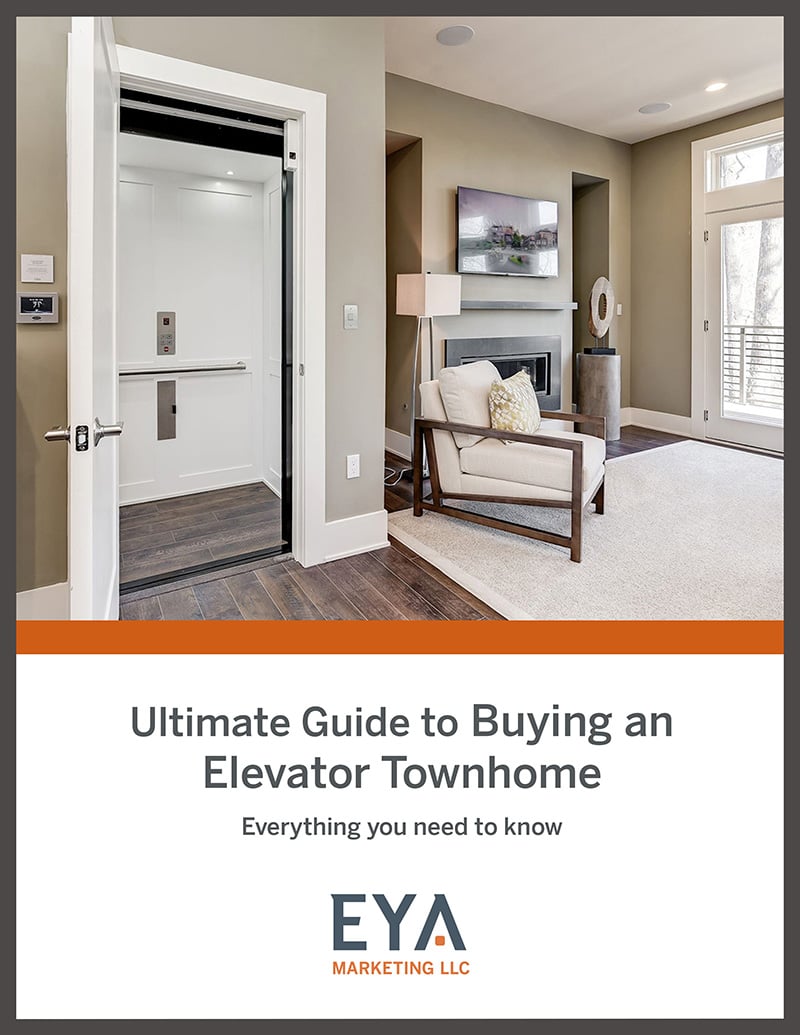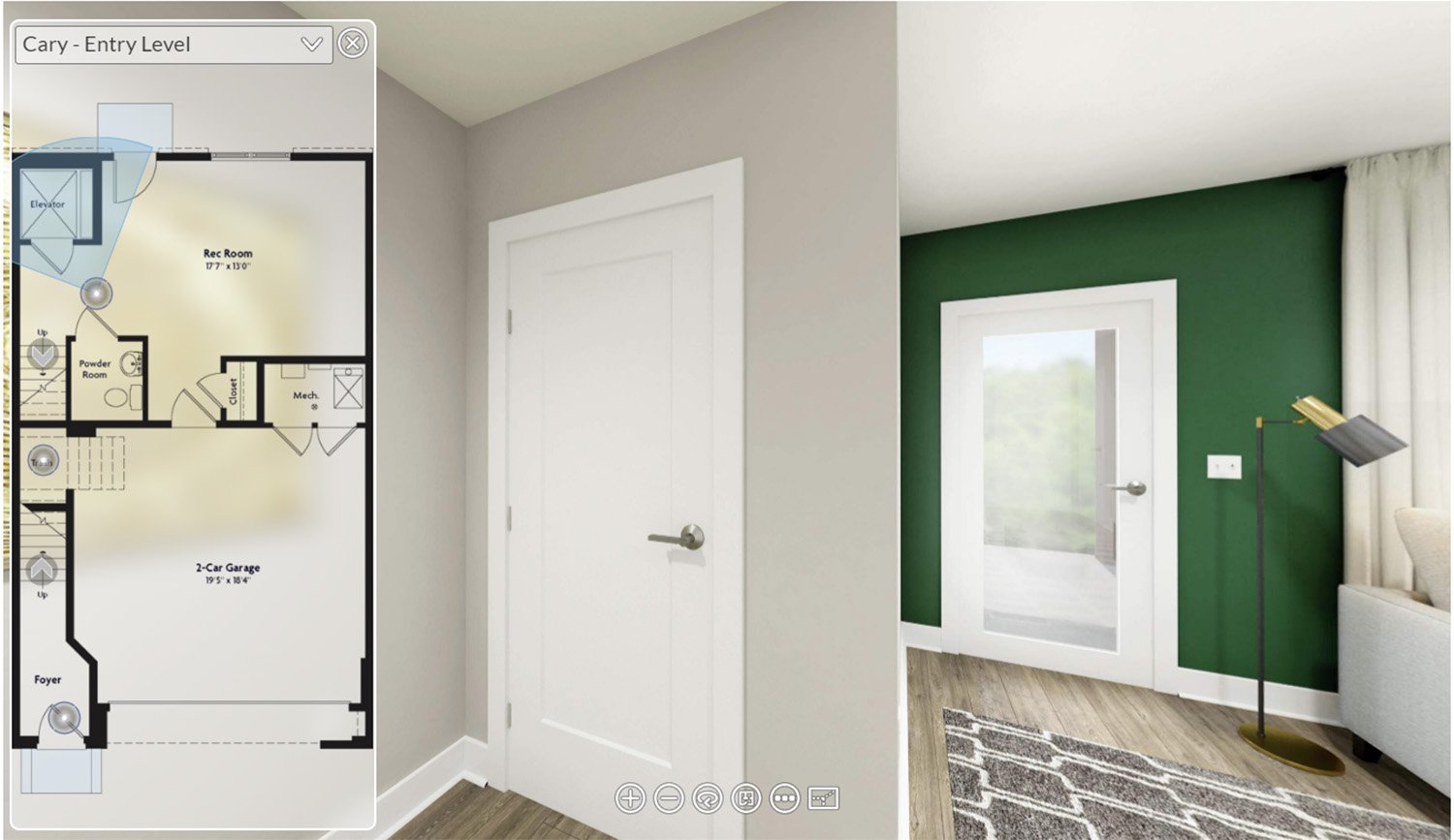
When searching for a new home, many factors influence where and how you want to live—from location and price, to choosing the features that are important to you now, and in the future. One feature that can truly transform a home and elevate your lifestyle (pun intended!) is an in-home private elevator, offering added convenience, safety, and more years to enjoy your home.
In this guide, we will walk you through the benefits of an in-home elevator, talk about frequently asked questions on topics such as safety and maintenance and more. Plus, you can hear directly from EYA homeowners about why having an in-home elevator is important to them and from professionals in the industry.
Or, you can also fill out the form for a downloadable PDF version of the guide you can reference later.

While shopping for a new home, many folks realize they want (or need) more space than a typical condominium offers but don't want the maintenance and yard work of a single family home. An elevator townhome can provide an ideal combination of living space with ample square footage, yet without the maintenance of a single family home. All offering added convenience, safety and the opportunity to stay in the home longer.
For many, moving is not downsizing, it is simplifying and living a more carefree lifestyle. Plus, new elevator townhome communities are often situated in a location that offers walking distance to neighborhood shops, parks, and public transportation.

Elevator townhomes offer a variety of benefits including:
When deciding if an in-home elevator is the right option for you and your family, consider the increased convenience that it can provide. In addition to transporting family members and guests, homeowners appreciate the ease of moving groceries, strollers, luggage, and other heavy items.
Whether an elevator is for your own mobility or for the mobility of relatives or visitors, an elevator can make it easier and safer to get to each level of the home. It can also provide an increased sense of security to anyone who has difficulty going up and down stairs.
For empty nesters, an in-home elevator may help you to stay in a home you love longer and to continue to enjoy an active urban lifestyle. Otherwise, to avoid a home with stairs the choices may be limited to condominiums, apartments, or single-level homes.
Want to hear directly from our homeowners about why an in-home elevator is important for them? Watch this video to hear what they love about their elevator townhomes.
Our homeowners cite the added convenience, ability to plan for the future and safety for less mobile family members among the reasons why they chose an elevator townhome.
To learn more, click here.
“Initially, I didn’t think we’d be using the elevator very much, but having the convenience of the elevator driving in the garage with groceries and taking them up two floors to the kitchen or taking the kids, coming home from college, taking all their luggage up to the fourth floor on the elevator - makes it so much easier.” – Michael C., Chevy Chase Lake homeowner
"If I have my father who is elderly or visitors who are not as mobile, it goes from the ground floor all the way to the top floor, unrestricted on any level and you can get easy access whether you're limited in your mobility and that's very, very attractive." – Kevin E., Grosvenor Heights homeowner
“We knew what it was going to be like to age in place, and we wanted to be able to age in place in a home that we actually owned and lived in without somebody taking care of us. And we know we can do it here.” – Lenore P., Grosvenor Heights homeowner
What type of maintenance is needed on an in-home elevator? Are they safe? These are the questions you may have while considering a new elevator townhome.
We sat down with Oliver Perry, General Manager at Premier Lifts, to get the answers from the professionals. Premier Lifts has been in business for over 30 years and has installed thousands of residential elevators throughout the Virginia, Maryland and D.C. area.
Hear from Oliver below his answers to some of our most frequently asked questions.
In your experience, what are the top reasons buyers choose an in-home elevator?
Many who choose an in-home elevator do so for convenience rather than need. As a significant number of new homes in the DMV are built up (with three to four stories) instead of out, an elevator is almost like an essential appliance for transporting luggage, heavy items, groceries and more throughout the home. It is also very useful, for example, if someone recently had surgery or is experiencing limited mobility, it offers the ability to continue to move throughout the home when it may not be possible (or as easy) without the elevator. Essentially, it offers the ability to plan ahead for the future.
Are in-home elevators safe?
Yes, residential elevators have proven to be very safe. They include safety features such as back-up batteries should you lose power and come equipped with a phone to call for assistance if needed. One thing to keep in mind is that a land line is required for installation. Should you get in the elevator without your cell phone, you want to ensure there is a way to call for assistance. Also, families need to make sure kids know they are not a toy and shouldn't be riding in it alone for fun or playing in it.
What are some of the most common maintenance issues and tips to maintain the elevator?
Like all appliances, there are parts that wear out over time and should be replaced. For example, back-up batteries may last 2-5 years depending on use. The best tip for maintaining an elevator is to get it serviced once a year so that the parts can be inspected and replaced as needed. New elevators come with a warranty. Post-warranty, homeowners can either purchase a service contract or request service as needed. Residential elevators can last for many, many years, especially if well maintained.
Is the design of an in-home elevator different from a commercial elevator?
The design of an in-home elevator is typically much nicer than a commercial elevator. The interior is finished, painted/paneled and the elevator door often is designed to blend in with the home, resembling a cabinet or closet. One of our clients uses the elevator essentially as an extra closet to store her vacuum cleaner, and just calls the elevator to whichever floor she wants to clean!
In many EYA homes, the elevator door looks just like a closet door and you'd never know the difference, which is nice from a design perspective.

Over the years, many EYA neighborhoods have featured in-home private elevators. Not only does it offer a level of convenience, but it’s also a way for homeowners to plan for the future. Whether it comes to relatives with lesser mobility coming to visit, an unforeseen change of circumstance, or a seamless way to move about your home, an in-home elevator can expand the ways you'll enjoy your new home.
Explore EYA neighborhoods featuring in-home private elevators:
Farmstead District, Rockville, MD
Reservoir District, Washington, DC
